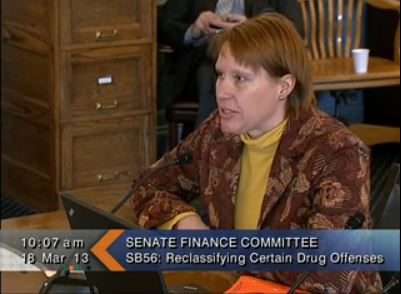
Some Juneau police officers are speaking out against a bill in the Alaska Senate that would reclassify certain drug crimes.
Right now it’s a felony to possess small amounts of narcotics, such as heroin, oxycodone, cocaine and methamphetamine, even if you do not intend to sell those drugs.
Senate Bill 56 would make possession with no intent to sell a misdemeanor. It’s sponsored by Eagle River Republican Senator Fred Dyson, who says the state is spending too much to lock up non-violent offenders.
“Sixty percent of the population in our corrections institutions are nonviolent,” Dyson said. “We just built a $250 million prison, Goose Creek, and the Corrections people tell me that if we keep incarcerating people at the rate we are now, we’ll have to build another prison that size in seven years.”
Dyson’s office estimates millions of dollars in annual cost savings for the Department of Corrections if the drug offenses are reclassified.
But Juneau Police Lieutenant Kris Sell worries the change would send the wrong message to criminals. Sell is vice president of the Alaska Peace Officers Association, which opposes SB 56. She testified on behalf of the organization at a hearing Monday before the Senate Finance Committee.
“The sheer power of addiction and the cost of the drug drives users to lots and lots of criminal activities,” Sell said. “While we may talk today about this particular possession was nonviolent, there’s been no reference to whether or not this is a nonviolent person. There’s been no reference to whether or not they’re committing other felonies, like burglary or stealing your checkbook, or your credit card.”
JPD Drug Enforcement Officer Lee Phelps also testified that drug crimes go hand in hand with violent offenses. Currently it’s a felony to have a firearm while in possession of any amount of narcotics. Phelps is worried that will change under SB 56.
“I recently arrested someone who possessed two firearms, and possessed heroin and cocaine and methamphetamine, where I charged him with four felonies – two Class B felonies for misconduct involving weapons, and then for possession of the controlled substances,” Phelps said. “If this bill were to pass he would be charged with a Class A misdemeanor. I think that would be a gross injustice.”
Other law enforcement officials from Anchorage testified in favor of the bill, as did the executive director of the state’s Advisory Board on Alcoholism and Drug Abuse.
But Richard Svobodny – Deputy Attorney General for the Department of Law’s Criminal Division – said it might have unforeseen consequences, including the cost of re-litigating cases already prosecuted under current drug charges. He also said it could endanger the state’s Therapeutic Court program, which allows offenders to get jail time and fines reduced in exchange for a guilty plea and completion of a treatment program.
“If you want to deal with this problem and the problem is spending too much money on jail, then we need to have some mechanism that is not covered in this bill that deals with getting people into treatment,” said Svobodny. “This bill, in many respects, may well be a disincentive to treatment.”
Svobodny said his comments were not intended to be the official Law Department position on the legislation. He also did not know the financial impact of the bill.
SB 56 was held in the Finance Committee for another hearing.
